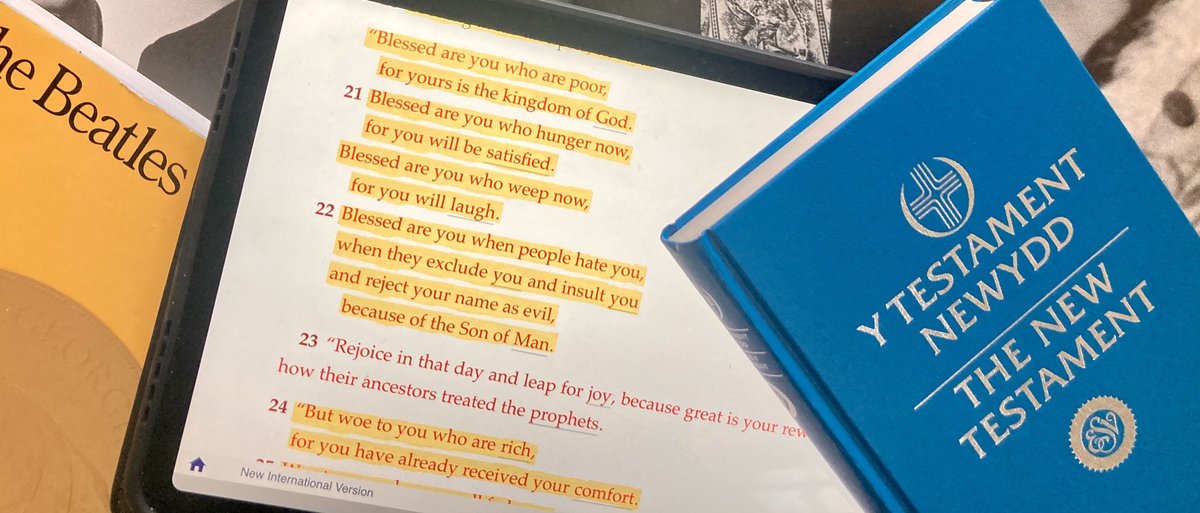Pause for thought: The Beatles and the Beatitudes

The Beatles and the Beatitudes
Recently, Peter Jackson, most famous as director of the Lord of the Rings trilogy, edited footage of the three weeks in 1969 when the Beatles recorded their final album. It’s a marathon of a documentary, almost 9 hours long, but it’s also fascinating. It reveals how the creativity of the Beatles was fuelled by marmalade on toast and it shows how, in their final months as a band, the sometimes-fractious relationships between the Fab Four inspired them to compose some of their most timeless tunes, including “Let it Be” and “Get Back”. Their plan was to end the three weeks by performing in an ancient auditorium in Tripoli. Eventually, though, they simply decide to climb up to the rooftop of their studio in London and play a concert to the astounded people walking past.
As the police desperately try to gain access to the rooftop to put a stop to the concert, the filmmakers interview people on the streets below. Some are unhappy at the music blasting out, while others are excited by the final time the Beatles would ever perform in public. The interviewers then come to an ageing vicar. We might expect him to side with the greying businessmen condemning the loud music. Refreshingly, though, he doesn’t play into the stereotype of the grumpy Christian bemoaning noisy youths. Instead, he looks up to the roof, smiles warmly, and says that rarely do people get anything for free and how wonderful it was that the young people were enjoying it so much!
As I watched that joyful, unpredictable vicar, I was reminded somewhat of the God that he was following. The Bible reveals to us that our God is the God of the unexpected. Jesus’s teaching reveals a God who topples our predictions and confounds our expectations. In particular, he doesn’t side with the people who we think might deserve it. Instead, he embraces the people that our society believes should be side-lined or ignored. This God of ours brings the people on the edges of life to the centre stage – all the lonely people, as the Beatles put it, but also the poor, the hungry, the homeless, the grieving, the depressed, the anxious, the struggling, the lowly, the gentle, the marginalised, the powerless, the hated, the outsider, and the unwanted.
In the Beatitudes, Jesus astonishingly refers to these people as “blessed” (Luke 6:20-26) – or even “happy” as the Greek word used (makarios) can be translated. In God’s eyes, it is the struggling people on the edges of our society who are blessed and happy. This sharply contradicts how our world seems to work – where the rich, the capable, the successful, the powerful, and the famous are glorified, while others are viewed as expendable consumers, to sell things to or to be discarded as unprofitable or useless.
The Beatles famously sung that “all you need is love”. Whatever they meant by that, our faith reminds us that Christian love is something radically different from saccharin-sweet Valentine’s Day love. God’s love destroys the dominant worldview and ushers in a strange kingdom that has dramatic implications on our lives. It demands that we ask ourselves some searching questions. Who do we glorify in our world? Who do we demonise? How do we view certain people and groups? Are we truly living out our upside-down, downside-up, topsy-turvy, flipped-around faith? Or are we simply standing around, like the predictable people in the Beatles documentary, complaining about the noise and looking down with disdain on those who are not like us? And are we too quickly slipping into our comfort zones and descending into the stereotype of how we think a “normal” Christian should behave and react?
One thing is clear – there’s nothing normal about our faith, and neither is there anything comfortable, snug, or predictable. Instead, Jesus introduces us to the God of the unexpected and, by doing so, he rips up and tears apart all the world teaches about human nature. In our faith is a radical, revolutionary call to sacrifice, love, and compassion. Through our faith, God can, and, with our help, will, transform our broken world.
Rev Canon Dr Trystan Owain Hughes